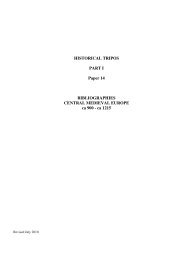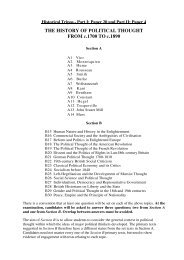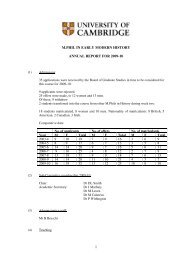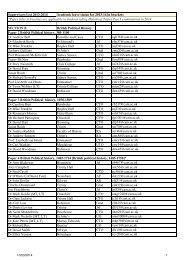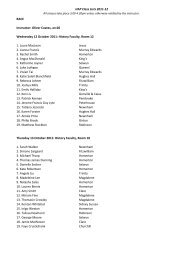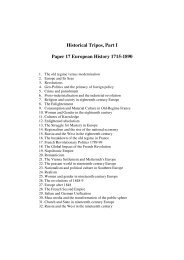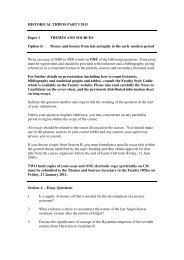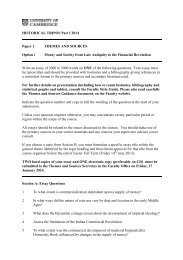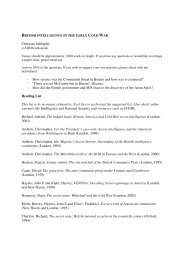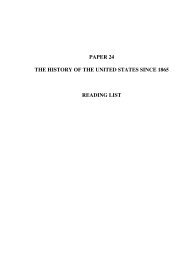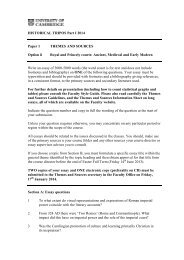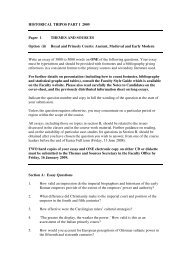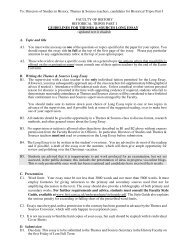Course Handbook - Faculty of History - University of Cambridge
Course Handbook - Faculty of History - University of Cambridge
Course Handbook - Faculty of History - University of Cambridge
Create successful ePaper yourself
Turn your PDF publications into a flip-book with our unique Google optimized e-Paper software.
There are several research seminars in Economic <strong>History</strong> going on at <strong>Cambridge</strong> during Full<br />
Term: Early Modern Economic and Social <strong>History</strong>, Modern Economic and Social <strong>History</strong>,<br />
Quantitative <strong>History</strong>, <strong>History</strong> and Economics, and Medieval Economic <strong>History</strong>. These<br />
involve scholars -from both within and beyond <strong>Cambridge</strong>- presenting their research<br />
(almost invariably still unpublished) to an audience <strong>of</strong> graduate students and senior<br />
members <strong>of</strong> the <strong>Faculty</strong>, followed by an open discussion. Additionally, there is a Graduate<br />
Workshop in Economic and Social <strong>History</strong> organised by graduate students and where<br />
graduate students present their work. They are all wonderful opportunities to witness<br />
research in progress, to understand how different methodologies are applied to specific<br />
research questions, to learn about the latest research trends within the discipline and to<br />
understand how to formulate questions and participate in discussions about other people’s<br />
work, all <strong>of</strong> these important skills even on fields away from one’s own.<br />
The programs are updated early each term in the <strong>History</strong> <strong>Faculty</strong> website.<br />
Students for the MPhil in Economic and Social <strong>History</strong> are expected to attend these<br />
seminars regularly, in particular the Core Economic and Social <strong>History</strong> Seminar in<br />
Michaelmas Term (Thursdays, 5pm, Trinity Hall).<br />
2.3 Assessment Procedures<br />
2.3.1 Part I (40%)<br />
Central Concepts and Problems <strong>of</strong> Economic and Social <strong>History</strong> and Theory (10%)<br />
This is a term paper <strong>of</strong> up to 3,000 words based on questions dealing with themes discussed<br />
in the sessions, and handed in at the end <strong>of</strong> Michaelmas term. There will be approximately<br />
two questions per session. The purpose <strong>of</strong> these essays is to examine a central problem or<br />
issue discussed in the relevant secondary literature in a critical way. They should<br />
demonstrate sound knowledge <strong>of</strong> the literature in question, but should be more than a<br />
narrative summary. The essays are generally quite broad ranging and should be based both<br />
on readings listed in the individual bibliographies for each session as well as additional<br />
more specific readings supplied by the session teachers.<br />
Research Methods (10%; composed <strong>of</strong> Research Methods Training course -6%- and<br />
Dissertation Proposal Essay -4%-)<br />
Students will submit workbooks for the Research Methods Training Modules. These are<br />
marked by the instructors involved in the Joint Schools Social Science Research Methods<br />
<strong>Course</strong> on a fail, pass or high pass basis. For the purposes <strong>of</strong> its marking scheme, this MPhil<br />
adopts the following convention: fail = 55%, pass = 67%, and high pass =75%. Non<br />
submission <strong>of</strong> a workbook will count as a fail on that workbook. Students must receive a<br />
majority <strong>of</strong> pass marks on their workbooks to pass this part <strong>of</strong> the course. A majority <strong>of</strong><br />
high passes will result in a mark <strong>of</strong> 75%. There is also an essay required for some <strong>of</strong> the<br />
Modules. NOTE: FOR THE ECONOMIC AND SOCIAL HISTORY MPHIL THIS IS<br />
THE SAME AS THE DISSERTATION PROPOSAL ESSAY BELOW, in which<br />
students should endeavour to apply conceptual knowledge learned in the Research Methods<br />
sessions to their own research plans. It should be handed in to the MPhil <strong>of</strong>fice in the<br />
<strong>History</strong> <strong>Faculty</strong>.<br />
Dissertation Proposal Essay (4%)<br />
This essay, <strong>of</strong> up to 4,000 words, is intended to help students define the scope <strong>of</strong> the<br />
dissertation as well as the sources and methods to be adopted. It is primarily an<br />
historiographical investigation <strong>of</strong> the secondary literature, which contextualises the topic<br />
which is to be investigated, in the dissertation. This is done by drawing on a relevant aspect<br />
<strong>of</strong> the qualitative and quantitative methods teaching in the joint schools’ courses. The<br />
approach should place the planning <strong>of</strong> research in a broad context that defends choices <strong>of</strong><br />
7




